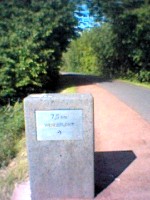Rabi writes about the non-hollywood reasons why teaching […] is an awesome job. She’s a teacher (for only two more weeks, alas) at an urban school in the United States, which probably is quite different from my rural one here in Germany, but many of her reasons are true for me as well. (Bold captions are quotes from Rabi’s posting.)
1. you work with a diverse group of colleagues.
While I’ve found that teachers share many attributes that outsiders would consider stereotypes, I enjoy the fact that conversations in a group of teachers are rarely boring because they all teach different subjects and thus are experts in different fields. While I often think that other mathematics or science teachers “get” my ideas the best, there are often interesting points of view provided by teachers of languages or social sciences.
3. you never have to do the same thing two days in a row.
You could even say “you never have to do the same thing two lessons in a row”. Teachers in Germany teach more subjects and classes than teachers in the US generally, so this statement is even more true for me. Right now the only thing I’m teaching twice is physics in 8th grade, and even if I start out with the same lesson plan in both classes (which I don’t do all the time), the lessons often end up being very different because the students ask different questions or provide different ideas to explore. – The only thing that really gets boring fast is grading tests because you have to read the same thing over and over again. Right now I should be grading math exams from my 12th grade Leistungskurs, but you can see that I’m procrastinating… ;-)
4. you learn a lot about a lot.
I started out studying physics (and later, mathematics) because they are subjects I care about and wanted to find out about and thought I was done learning when I got my degree(s)*, but I’ve continued to learn since then. The newest aspect of my work these days is helping a teacher in training with the second part of his education – he visits some of my lessons to watch me teach, then teaches some of my lessons while I watch him (and the class) and discuss his lessons with him afterwards. In a sense I’m not just teaching my subjects, but teaching how to teach them as well – if only just a little bit.
5. the commute is rarely during rush hour.
School starts at eight for me so I drive to school while other people drive to work, but I usually drive back earlier than people with nine-to-five jobs because I do a lot of my work at home in the afternoons or evenings. Being able to manage some of my time is a nice bonus of my job as well (see number 8 on autonomy). Right now I coincidentally haven’t got any lessons in the afternoons, which is nice, but the mornings are more stressfull because my schedule is so tight.
6. you have to become an expert at time management.
I know teachers at other types of schools (elementary schools etc.) have to teach more lessons per week than I do, but if you’ve got 24 different lessons in about eight different subjects/classes to prepare you’ve got your work cut out for you. Add preparing and correcting tests, grading work, teacher conferences, excursions and Abitur exams to the mix, and you are never bored. Yes, I procrastinate sometimes or decide to spend a lazy afternoon lounging on the balcony and reading a book, but then I’ve got to work evenings. I never imagined that teachers pull all-nighters at their desks correcting exams, but that’s what I (and several of my colleagues) do.
7. teaching is high intensity.
Never a dull moment! You always have to pay attention to several things at once: the subject you’re teaching, the method you’re using to do it, the students and their problems and behaviour (both as individuals and as a group), and last but not least the many rules that come with a job as a public servant.
8. you are essentially autonomous.
Except for the plans provided by the state which say what has to be taught in which subject and year, I can decide what to teach how, when, in what order and with what methods. I can have my students do experiments or projects, work alone or in groups, I can play with fun physics toys do demo experiments for the students, and I can even decide on the spur of a moment to ditch my lesson plan and do something completely different because of a student’s question or suggestions. It never gets boring!
10. you get to spend every day with people you adore.
Well, it would be dishonest to state that I like all my students equally, but every student is an individual with likable qualities. One may be very bright, one may be creative, one may be talented in a certain area, one acts very social towards the other students, one may be good at explaining so other students understand, one puts everyone in a good mood with a little joke (and you can learn better when you’re having fun!)… you get the idea.
All in all I can say that I love my job and that so far, there never was a day I regretted becoming a teacher.
———
* Teachers in Germany have to have two degrees in order to be allowed to teach at public schools. First you study two subjects and get a university degree (erstes Staatsexamen), then you have to complete two years of teacher training (Referendariat) and a second degree (zweites Staatsexamen).

